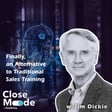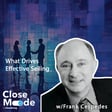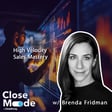Introduction to CloseMode
00:00:05
Speaker
Hello and welcome to another edition of closed mode, the enterprise sales show.
Guest Introduction: Arup Chakra
00:00:09
Speaker
I am Brian deep Meyer, CEO of closed strong AI, the home of precision guided selling.
Arup's Professional Background
00:00:15
Speaker
And today I'm really lucky to be here with a group chakra of RT, uh, and, and also excited about the subject we're going to be talking about, but, uh, just a little background.
00:00:26
Speaker
Arup's got a lot of experience in in the sales and and enterprise selling. A fellow of the Institute of Sales Professionals Ambassador at Sales Enablement Council held several positions in sales enablement and sales ops at Equifax and Elavon, if I'm saying that one right. So welcome to the show.
Mindfulness & EQ in Professional Life
00:00:46
Speaker
Awesome. Thank you very much Brian for having me on.
00:00:49
Speaker
So the topic for today is mindfulness or EQ and how they overlap and how, how we can use that. And it and it's funny because last week you and I were chatting and we wandered.
00:01:01
Speaker
into a discussion about mindfulness and meditation and, and how we both use those tools to improve our lives and improve our professional lives.
Addressing Skepticism About Mindfulness
00:01:10
Speaker
And, and, and I will also tell listeners, you you and I hesitated like, it is this too, you know, kind of out there and conceptual for people. And we both said, no, this is something we really want to talk with, with talk to each other about and and share with our listeners. So yeah.
00:01:29
Speaker
Yeah, no, no, no, thank you for actually thank you for bringing this this subject to life. And I think I think there's still a lot of data that we could probably gather in terms of how folks generally react to the subjects of media meditation and mindfulness. I think at the moment, you know, what we've what we've exchanged actually between between, you know, obviously, one conversation to date.
Qualitative Insights on Mindfulness
00:01:50
Speaker
But I think that's quite kind of symbolic of the conversations that I've had is like, nobody's really quite sure if it feels a little bit, a little bit too new age for, you know, for rapid discussion in sales and professional circles, or whether actually, it is something that salespeople are now starting to kind of really engage with and and, and, and, and, and sort of get value from. So I, you know, I don't, I don't know if there's any data, I think, again, it's, it's all sort of
00:02:16
Speaker
qualitative assessments that we've got, you know, just in terms of how we've seen other people
Mindfulness Techniques Explained
00:02:21
Speaker
respond to it. So when you told me last week, when you told me that story about the sales kickoff, I thought, actually, that was that was awesome. Because again, you know, that that just shows you how sometimes you have your own shield up, you have your own kind of you look at things through your own biased lens, and and maybe that's not the reality.
00:02:39
Speaker
Yeah. So let, let's start with, what we're going to end this today with talking about like winning and losing deals and screwing up presentations and and try to make this tangible about how some of this mindset works. But I want to start with like at a high level, what the heck even is mindfulness? How how would you describe it?
Concept of Being Present
00:03:00
Speaker
Uh, definitely describe it as present moment awareness.
00:03:06
Speaker
Yeah. And I think it's it's a difficult one to sort of, and again, I've been practicing meditation and mindfulness much more seriously for almost two years now from January, 2023. And I think one of the concepts that I've been trying to get myself comfortable with is that when you're practicing meditation or mind when when when you're practicing mindfulness, right? I think I guess there there are a number of techniques that you have that sit underneath that practice of mindfulness. Meditation is one, deep breathing is another, even stretching exercise is kind of intentional stretching exercise. yeah they're all They're all activities that help you feel
00:03:44
Speaker
as if you're in as if you're in the moment. What you're what you trying to do when when you're being mindful is be aware of the now and and almost tune out some of the distraction that you have.
00:03:57
Speaker
And interestingly, a lot of that distraction is the distraction, the the sort of the the noise and the voices you have in your own mind. So it's not even necessarily the kind of external distraction, right? Because I've i've actually practiced, I mean, i've I've meditated, closed my eyes and meditat meditated on a busy train. And it's, it's I think it's much easier for us to tune out that external noise, but to be able to somehow feel in
Managing Internal Chatter
00:04:21
Speaker
With the noise that we have in our own minds i think that's that's what mindfulness is it's about being able to get comfortable with that it's not trying to switch it off. because I think trying to switch it off isn't isn't necessarily positive it's about just being comfortable with it being comfortable with. What all of that chatter and still being very very comfortable in the moment and and and that that's yeah yeah that that's that's how i describe it yeah i. i think i'm doing yeah i Yeah, no, I think you did. it's It's interesting,
Mindfulness & Emotional Intelligence
00:04:49
Speaker
too. One of my favorite writers is Thich Nhat Hanh, who's a a Vietnamese Buddhist monk. And he talks about a lot about monkey brain. And yeah like and and I love that. like that's so That's so visual for me that it's like we have monkeys chattering in our brain, and that's what you just said. it's like And the further, what what he said to me, that mindfulness is is you're starring in that movie.
00:05:14
Speaker
right? That whole chatter in your brain. you' say If you can, sleep you can back up and observe the movie. And and that that to me is that like that that present awareness to go okay, I am aware right now that I'm panicking in my brain. And I'm observing that but I'm not going to be in the middle of the panic. We just make so much better decisions when we stop getting sucked into that vortex of the market chatter in in our brain so i wanna clarify something and i'd love your perspective on this for folks who are listening you know that there is a really strong correlation between mindfulness and eq and i think they're they're almost interchangeable and in some senses so but,
00:06:00
Speaker
What we're talking about is very often associated with Buddhism and and and Zen Buddhism, which is the the the practice that I have. you know And you were talking about your experience i mean many years ago. like I went i'm went as far as spending time in a Korean temple for months, not living there for months, but studying the precepts, the Zen precepts, and accepting Zen precepts, and doing overnight silent meditation. So it's like, I am way far from an expert at this stuff. But I i know how it helps me every day. But here's my question for you.
Buddhism & Mindfulness
00:06:29
Speaker
is Buddhism ah religion. mean Yeah, so I suppose um ah it's because it's what what it's defined as ah a deity religion, right? So it is still considered to be a religion, obviously practiced by a lot of people across the across the world. There isn't ah a God or a deity to it.
00:06:51
Speaker
like the The Buddha himself was you know as as ah an individual man, a human being. I guess it still is religious because it still has concepts such as reincarnation embedded into it. um maybe just to to to I mean, and i and I have a lot of respect for the for the Buddhist religion. i'm not I wouldn't call myself religious. I'd say I'm spiritual, but I wouldn't call myself religious. My attraction to meditation and mindfulness was never from a religious perspective. It was always from that process of the more I'd read about it and the more I started to read about it, and in particular, you just mentioned it.
00:07:29
Speaker
in particular its correlation with the ability to improve your emotional intelligence and your emotional quotient. I read in a number of places that meditation was ah ah a really strong practice to help you build that up and and and equally at the same time yeah as it was kind of consuming
Mindset, Self-Regulation & Performance
00:07:47
Speaker
that material. I was also really interested in high performance and what drives high performance and and everything comes back to mindset self-regulation, self-belief, that process of of of of having structure, that 1%, that marginal gains approach towards everything, towards like, you've got to have that discipline, you've got to have that structure, to have that balance, to have that self-regulation. So many folks, high performers that that I'd heard in podcasts and read and and all the rest of it, across a number of disciplines, with rich sport, business, politics, etc. Everyone was saying it was it was
00:08:21
Speaker
mindset and a lot of folks were saying that they they practiced meditation as well to help yeah them maintain that mindset. So for me, it wasn't religious. It was like... Yeah. Yeah, I agree. And and i love I love your focus on high performance, right? This is an enterprise sales show and that's... And and and so, yeah, i I will tell you that my perspective on that religion thing is, you know, that the head of the the Buddhism ah world is the Dalai Lama, right? And now Dalai Lama said really that Buddhism was the first the first psychology. and And I love that. That's that's how he he he designs it like he and and and furthermore, he he works with many of the the great world religious leaders to to incorporate meditation into your practice, like you can have, you know, that religion and you can still use hours because it is a psychology and it in it and it is a mind practice. And there's also He's done a lot of work with neuroscientists about what happens to your brain and the strength of your brain and the strength of your performance when when you meditate. So yeah, just a ah quick question for you. what What pulled you toward this approach? Like at what point did you, and you started to touch on this a little bit earlier, I think rel relating to performance.
Arup's Mindfulness Journey
00:09:35
Speaker
Yeah. So I think in, three things happened.
00:09:40
Speaker
in in through the through the course of Q4 2022. This will be probably very specific to to to any of your UK ah audience. We have an annual show here called the National Sales Conference.
00:09:55
Speaker
So I went to that, and I know the gentleman who organizes it, the the the end of the organization puts all the effort and the energy behind it, but they had a number of speakers on stage, one of which was, again, a British cyclist from from from from the yeah i mean one gold in 2012 Olympics, et cetera, and a ah number of speakers on stage that were consistently going back to this message of the mindfulness and meditation being yeah kind of a strong proponent for being able to drive performance. So I, you know, I, I think I was in that place where I wanted to understand what drives mindset. Like how do you, how do you grow?
From Fixed to Growth Mindset
00:10:36
Speaker
Like when we talk about, and this idea of growth mindset versus static mindset or fixed mindset has been around for a while too. And I was kind of really curious to understand like, what are some of the techniques? like It's so easy for us to kind of go.
00:10:48
Speaker
okay, I'm a fixed mindset person, right? Because because nobody wants to, sorry, I'm a growth mindset person, because nobody wants to classify themselves as a fixed mindset person. But actually, if you've got a little bit of emotional intelligence, then by its very nature, you want to be able to say, okay, these are some of my traits that and I need to work on, because they're more fixed mindset traits. And I've noticed that about myself. I'm actually I need to kind of think about how do I grow that from being a fixed mindset trait to being more of a growth mindset trait. So I wanted to explore some of the drivers behind that, some of the drivers of how can you do that because it's it's the self-identification and the self-motivation that means you towards, I want to be a high performer. At least, I want to be a
Starting a Mindfulness Practice
00:11:28
Speaker
better performer. I may not be the highest performer, but if I set the bar being better than I was yesterday, then then I'm moving towards that. and and What I started to discover was
00:11:36
Speaker
that that meditation was a strong practice behind that. The second thing was we talked about this actually just before the show, I read Daniel Goldman's emotional intelligence at the same time. And and that everything in there about self regulation, a lot of the techniques that he talks about comes back to, again, meditation mindfulness. And the third thing was I was listening to, again, a very UK specific, so my apologies,
00:11:57
Speaker
a show here called the High Performance Podcast, and and it came through on that too as well. So like I had, you know, some maybe this is confirmation bias, but I had a number of stars kind of all leading me towards the same the same conclusion. and And when I got back in, you know, we'd been on holiday that and festive season 2022 into January 2023. When I came back, I think one of my first commitments to myself was Okay, let's start this. Let's see how it goes. It doesn't have to be scary. yeah Let's do 10 minutes a day. you know Every two or three days, let's just factor it into the working week and just see how it goes. And and it just built up from there.
00:12:35
Speaker
And we're gonna, yeah, we're gonna chat in a moment. For for those who aren't from familiar, like, I'd love to hear you like your most basic approach to meditating. And I will share mine as well, because I think that's, that's ah kind of mystical to some people, this this
Mindfulness Success Stories
00:12:49
Speaker
notion of it. But it's funny, one one of the reasons I wanted to do this podcast is Uh, I was doing a pre-interview for a podcast probably six months ago. And one of the questions I asked the guest often is what's something you've done as, and this person was a sales enablement lead, you know, as a sales enablement lead, what's something you've done that you were surprised at the results of either good or bad. Like you thought this is going to be the best and you know, the organization was just like, no, this is stupid. Don't ever do that again. And it surprised me. She said they had a last minute cancellation at SKO.
Handling Failure Through Mindfulness
00:13:21
Speaker
And, and she brought in a friend of hers who was a mindfulness expert. And, and, and she was so afraid that I think she said that it's like, she was like, my peers are going to say, oh, this is just some hippie dippy crap from, you know, from, from her. And, and the, the reaction and the scores at the SKO for the mindfulness session were quite high.
00:13:42
Speaker
And she was completely shocked by that. So that gave me the confidence to say, Hey, I think there's some interest here. We should talk about it. And it's funny too. one One of the things that pulled me toward this approach is many, many years ago, I remember the time I was sitting in my truck in a target parking lot for some reason up near Wisconsin. And one of my partners said to me, you're really good when things are going well, like you spread the money around, but when things go bad, you suck.
00:14:07
Speaker
like you and And i did find that i got my clock cleaned emotionally when i lost the deal or something and and my team was feeling that and i reached out to a friend of mine leo. Who who leads men's groups on mindfulness and stuff and and he's this gravelly old baron and leo i call him up and i'm like man care carry told me this like this is troubling and he said.
00:14:31
Speaker
Deep Meyer, how many times have you failed? And I was like, well, wait. And I was just like, and you don't want to be too cocky about that. But I'm like, no, things have gone well. Like I've worked really hard. Things have gone well for a number of years. And he said, yeah, you suck at failure. Like you don't know, you don't have a lot of practice at it. You don't know how to fail.
00:14:49
Speaker
And so that's that's a group what like what pulled me in. So let's let's do talk about, before we talk about you know scenarios, how how does this help you when you're getting your clock cleaned or something? So yeah, what what's what's your simplest approach to to ah meditating?
Easy Access to Mindfulness Practices
00:15:08
Speaker
Describing someone some once you try it. No, honestly, it's a lot easier these days. So I used an app, right? I'm not going to, i if you want me to name it, I can, but I think it's, it's quite common. i use that yeah this planet of this Yeah. So I use, I use Headspace. I don't know if it's the best app or not. i've I've had conversations with a few people, a few people like, hmm, comms better for this, that the other, I'm like, okay. I got, I think, I think what happens is, so it's, it's a lot easier to do. It's a lot easier to start new skills and new practices.
00:15:38
Speaker
now in in our kind of an arm modern near our contemporary areas i'm staying the obvious but it is it's easy enough to learn language is easy enough to know how to meditate you don't have to. Find yourself overly committed you can do it in your own time it's an app on the phone so you know if you want to do a day a week two days a week three days a week and just build it up from there you can.
00:16:02
Speaker
Yeah, I, yeah ah you know, I'd used I'd used headspace previously, maybe like four or five years prior, and done like the the beginners course, which was, you know, available for free, as a sort of a taster, and then never stretch beyond that. And then I went back to it and kind of committed and said, Okay, I'll pay the annual fee, which isn't substantial. I was like, I'll pay the annual fee and I'm i'm going to start doing it. and And it's part of that commitment to myself. yeah I made that promise to myself over that that that break, that kind of festive season break. And I was like, right, when I get back, if I'm really serious about wanting to see if this is a skill that can help me raise my own bar, well, then and it's 70 pounds for a year subscription, which is not huge. right So I was like, okay, yeah this is a small investment in in in many respects in myself.
00:16:46
Speaker
I and know and i work at it and and and i did and and and that and that was literally a bright just started off being ten minutes i think every three days and then it sort of became ten minutes every two days and then it went from ten to fifteen minutes and then what.
00:17:01
Speaker
15 to 20 minutes i took to be honest with you most days now last year i had my longest wrong run streak which i've not managed to catch and did i did 124 days uh every day consecutively i did 20 minutes a day every day consecutively and the only reason it stopped was because we went on holiday and i was like right so relaxed on holiday i forgot to do it yeah Yeah, and I would add, i'm i'm with I'm with you on Headspace and I would add too that recently I've been even looking on YouTube for guided meditation. so
00:17:34
Speaker
And, you know, there's, I don't want to get too much in the weed on this, but there's, there's contemplative and concentrative, uh, meditation and contemplative. The guided meditations on YouTube are free and, and most of them are about 10 minutes long. And, and if you're brand new to this, like I've done the, the concentrated stuff, which I'll talk about in a moment for, for years. And I've just now recently.
00:17:54
Speaker
We've gone to the guided stuff and i I kind of wish I would have started there. So so yeah, one can go to YouTube and and search. And you know what? you You might land on a couple that don't sound great. Skip over them and find one that's resonating with you and stay there. That's completely, completely. Yeah.
00:18:10
Speaker
I do guide it and it's it's it's it's good. it's it's it's it's you you know The voice is there. It just leads you towards where you need to be. It just reminds you about what you should be doing at a given point in time. It's great. You know what? It's great. and and you know what and I know what my biggest challenge is. Some days, I practice meditation great and and I'm i'm in my own in my own headspace without there being too much noise. and Other days, like today, this morning, I did it this morning.
Dealing with Internal Noise in Meditation
00:18:34
Speaker
There was a lot of noise and you know that's and that's the reality. monkey brain well the reality but i think but No, I'm sorry. i i want to I want to react to that because this is, yeah please you know, a lot of folks that ah that I've talked to about this. So the, you know, the concentrated stuff, it's a matter of.
00:18:53
Speaker
folks sitting there and focusing on your in breath and your out breath. And then all of a sudden the thought comes in. I'm really mad at Arub for something he did to me last week. And and it's it's thought labeling going, okay, I'm thinking about that. I'm mad at Arub. Now I want to bring myself back to to my breathing. Like I want to be in charge of these things that are in my head. And and by the way, they're always going to come up unless you're some kind of a flipping guru, the thought, and that doesn't mean you suck at it. And I've heard too many people go, I suck at it. And it's like, no, it's the practice of labeling that thought going, going back and but it's muscle memory. It's just like going to the gym. It's building that muscle memory in your brain of being able to observe what's happening versus being caught up in it. So let's completely let's talk a little bit about.
00:19:40
Speaker
street level, like as we near the end of our chat street
Resilience Through Mindfulness
00:19:44
Speaker
level. So you're, it's back to this thing with, you know, my partner, Carrie saying to me, you, you know, you suck at not doing well. Um, and, and so if, if we're, we're a sales leader or even a salesperson,
00:19:57
Speaker
And, and a lot of stuff that, that kicks our butt is we we lose a deal or, or we blow. I mean, and I was thinking about this, like I can think about presentations I've done on a soup or super important deal. And I, I just feel like I blew it. And, and it's like that, that thing after, like how how does, how does mindfulness like in in your like tools, anything, how does it help you? Yeah. When you're just sitting there wallowing in self-pity, cause you just blew something. So.
00:20:28
Speaker
I think that some meditation, it it's it's, you know, and I try to, and so I don't think. um my My partner says this to me quite regularly. She's like, why are you getting stressed about stuff? Do you meditate every day? Meditate every day. That doesn't suddenly mean like no all of this stress is just gone. It's great. Of course you're going to respond to things emotionally. Of course you are. and That's completely natural. I think what I found is that I now personally respond to things in a slightly more balanced way.
00:21:03
Speaker
I can see that at work, I can see that at home, I can see that my first initial emotional response, which is always there, and it always comes through just exactly as you were just just mentioning just just a few minutes ago, it always comes through. And actually, what I'm what i'm much better at now is kind of going, okay, hold on a second. You're responding to this emotion. I get to that place really quick.
00:21:24
Speaker
And then I walk away and and I'm sure people, you know, so I'm talking about my personal experience, but hopefully this this is resonating. I walk away and and you know, a lot of times when you walk away, you still have that, I wish I said this, I wish I said that, I wish I said yeah. And I notice, you know, I'm so much better at noticing the narrative and going, you know what Arub, there's no point. you You can stay in this dialogue, and so in you know, in internally, you can stay in this internal dialogue or you can kind of go,
00:21:48
Speaker
All right, it didn't work out. It didn't
Building Emotional Intelligence
00:21:50
Speaker
happen this time. Let's park it. Let's figure out in time, not now, but let's figure out what I'm going to learn from it. And actually let's figure out, I'm going to take this forward. And I know that I'm better at that because like you, I'm doing that practice every single morning. Like when a thought comes in, I'm labeling it, I'm going, okay, is this a good thought? Is it a bad thought? Is it how do I want to respond to it? Maybe I don't, maybe I just park it and i go back to concentrating on the breathing.
00:22:13
Speaker
um And and yeah I find it a read it's it's been really positive. and In fact, I'd say it's probably been really positive for me in my personal life, just in terms of being a little bit more balanced at home, a little bit more emotionally regulated. The the other thing that I'd say that i've I've noticed as well is that as the the the me the meditation practice has helped me build that you kind of emotionally and intelligence muscle,
Mindfulness in Negotiations
00:22:38
Speaker
um um I am a little bit better. It's a difficult one to measure. I feel like I'm better at listening. I feel like I'm being a bit more empathetic. I also feel like I'm trying to find that compromise.
00:22:50
Speaker
so yep and so So when I'm in kind of that negotiation situation, i'm not I'm trying to not get into a place where there's a the emotion comes in and it feels like it's zero sum. I'm trying to listen better. I'm trying to be more empathetic. And I'm also telling myself, don't get caught up in this. Try to find the compromise. Try to find the trade-offs. Try to find the pathway through this, because because you know you can. and You know you can.
00:23:18
Speaker
If you get caught up in the emotion if you get caught up in the exchange if you get caught up in the the heatedness Then then you're gonna allow it to become a zero-sum game and there's no point in that right? So so try to find a way through this and I think that that I feel like I do better at it Yep, it's cool. You know the one thing I would add for for listeners watchers here is I also find reading books about Zen or about meditation or mindfulness, like because they they present constructs. So meditation is that thing we do to build up the muscle in our brain so we can observe when when all hell's breaking loose in our brain and and try to adjust. But the books, like there's there's a couple concepts that, what one is called the second arrow, which is, this is stuff that I use every day. and the The notion of the second arrow is that as humans, like you know we could we could lose a deal.
00:24:09
Speaker
or or the notion, but the true story behind the, or the actual story behind the second arrow is you get hit with an arrow. There's actual pain there. Like that happened. And, but the second arrow is the one we shoot at ourselves where it's, what was me? Why did I have to get shot by this arrow? yeah And, and I, I find that like day in and day out, that reaction, look, the reality of life is here's a core problem. We believe stuff's going to be great forever. The reality is it's not.
00:24:38
Speaker
Great stuff doesn't last forever. Pain doesn't last forever. Losing deals doesn't last forever. So recognizing that first of all, life life's going to change like crazy. So just get ready for that and don't shoot that second arrow when that bad thing happens.
Perception of Events & Decision Making
00:24:52
Speaker
Because I would add to that that notion that like being aware of now I'm in the wild wing and the self-pity. The thing happened. I just lost a million dollar deal.
00:25:02
Speaker
That happened. that That's a real arrow I got shot with. When you start getting into that wallowing, there's there's no future there. And there's a concept that and I know I struggled with for a while, which is good isn't good and bad isn't bad. Like what what's what's happening is just what's occurring right now. and when we can And that helps me with the second arrow to go, okay, get out of this good and bad notion. This just happened. I just lost a deal.
00:25:28
Speaker
and and and Not labeling it as, oh my God, this is the worst thing in the world. You know, my whole career is going to fumble. That doesn't help. Saying this just happened, getting clarity of mind and saying, what decisions do I now need to make that are not reacting to the emotions related to this thing, but related to the real thing that happened. And that is the idea of, of good isn't good and bad isn't bad is like, this is just what's happening.
00:25:54
Speaker
Uh, let me get clarity and what's the best decision for me to make right now, which oftentimes has nothing at the moment. So anyway, for, for what it's worth, those are street level things that make a difference. When, when, you know, uh, we're, we're trying to pull in new investors or we're trying to get new deals closed and, and, you know, you you get your lunch handed to you and it says like, okay, this just happened now.
Practical & Philosophical Aspects of Mindfulness
00:26:16
Speaker
what Completely, completely.
00:26:20
Speaker
I think um but it's an interesting one, because I still struggle with that a little bit as well. I you know like how do you i mean, you've been practicing this for a while, right? And so your level of confidence is much higher. And I guess, you know, I practice on the basis that I see this as, I mean, and it's so it's I guess it's it's it's different, right? I still practice on the basis of I think this is a tool. like Mine is almost like this rational connection of, I think this is a tool. If I do this, it will lead to this and it will improve this. And actually, as I've been exploring the philosophy of it, I'm like, yeah, actually the philosophy is is is i mean it's it's really beautiful.
00:27:00
Speaker
Am I there yet to practice it on a more philosophy philosophical basis? I think i still have a ah few like I still have a few chapters to go before I feel like I'm i'm in that place from a majority perspective. but yeah yeah yeah um I still get emotional.
00:27:17
Speaker
way and and that's fine it's just being able of course that's going to happen right and then we just had to observe it and go okay i'm losing my i'm losing my crap right now like let let me let me get a little more centered and make better decisions yeah i i will end by sharing a story that that i had a teacher in this korean temple that i spent time in uh taught to us and you you may have heard this story but but i really like it and it's kind of the good isn't good bad isn't bad thing and But she tells a story about you know ah a farmer's horse ran away.
Avoiding Self-Inflicted Suffering
00:27:45
Speaker
You may be familiar with this. And the neighbor comes over and says, oh, that's really bad. Your your horse got out of the paddock last night and is gone. And and the farmer says, how how do you know that? How do you know that that's bad? And the next day, the horse comes back and the horse brought a friend back. So now the farmer has two horses.
00:28:05
Speaker
and And the neighbor comes over and says, wow, that's really great. And and the ah the that you know they get the guy with the horses is like, well, how do how do you know that? I'm almost done with the story. The third round of this is the son goes out to help break the second horse and train it. And he gets hurt. And throwing off the horse and gets hurt. And the neighbor comes over and says, oh, that's really bad. Your son got hurt. And the farmer, of course, says, how do you know that?
00:28:32
Speaker
And then you know that the final segment of the story is there's a war going on and the government's looking for people to fight in this war and they come to the farmer's house and his son can't be conscripted because he's hurt. And of course the neighbor says oh that's really good news and the pharmac says how do you know that and it's so it to to me i told that story at a wedding once and i feel like people looked at me like i was whacked.
00:28:56
Speaker
but maybe three people got it and and you don't know you have to let stuff play out overtime week we judge we go this is a really bad thing this is a really good thing and my simple response to that often is apparently.
Conclusion: Mindfulness in Sales & Leadership
00:29:09
Speaker
We don't know like we have to see how it how it how it plays out. So yeah, this is a been a really fun discussion. And as I mentioned before, if you know, we'll see what people's reactions are to it, but it's super, super helpful as it rates relates to performance. And I think being a good leader, being a good emotionally sound leader.
00:29:31
Speaker
and and being a seller who can accept the highs and the lows of doing and losing big deals and botching presentations. um it just You're right. it They are tools and they are evidence-based tools, and if they don't work, you don't do them anymore. Arup, I really appreciate you taking this journey for me. We are both ah you know ah sort of Taking our time to make sure that we wanted to talk about this on a business podcast and i'm i'm really glad we did and i'm really glad that that yeah you took that leap with me and thank you so much for you for your time and your ideas. No it's ah been a real pleasure brian and.
00:30:10
Speaker
I know we've been talking about something that you know you could consider a little bit left here, a little bit esoteric, but actually I'm also glad that I've had an opportunity to be able to bring it back to something really practical, such as like how do you tie that into high performance and how do you tie that into ultimately yeah yeah closing more deals at the end of the day, right? And that's what it's about.














